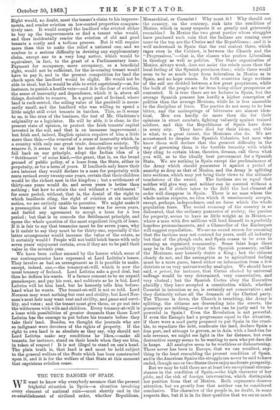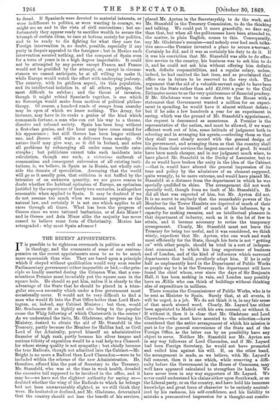tat. TRUE DANGER OF SPAIN.
WE want to know why everybody assumes that the present frightful situation in Spain—a situation involving every element of national ruin—must shortly end in the re-establishment of civilized order, whether Republican, Monarchical, or Caesarist ? Why must it ? Why should not the country, on the contrary, sink into the condition of Mexico, which in many respects it so greatly and grievously resembles ? In Mexico the two great parties whose struggles have produced such ruin that the Indians are coming once more to the top are the Clerics and the Republicans ; and it is well understood in Spain that the real contest there, which rages even in the Cabinet, is between the Church and the "Progressives,"—that is, the classes who profess Liberalism in theology as well as politics. The State organization of Mexico, always weak, does not assist the rebels more than the local feeling of the Spanish provinces does ; while there would seem to be as much hope from federalism in Mexico as in Spain, and no hope comes. In both countries large sections of the soil are divided between a few great proprietors, while the bulk of the people are far from being either prosperous or contented. It is true there are no Indians in Spain, but the average Spanish peasant has hardly a higher conception of politics than the average Mexican, while he is less amenable to the discipline of force. The parties do not seem to be less bitter, aqd the mainsprings of bitterness are almost iden- tical. Men can hardly do more than die for their opinions in street combats, fighting valiantly against trained soldiers, and this the Republicans of Spain have done in every city. They have died for their ideas, and this is what, to a great extent, the Mexicans also do. We are accustomed to despise the Spanish Colonists, but men who know them well declare that the greatest difficulty in the way of governing them is the terrible tenacity with which they cling to certain ideas, theories, dreams, call them what you will, as to the ideally best government for a Spanish State. We see nothing in Spain except the predominance of the Army which should guarantee it against a period of anarchy as deep as that of Mexico, and the Army is splitting into sections, which may yet bring their views to the ultimate touchstone of the sword. The factions are so equal that neither will give way, and neither can be coerced without a battle, and if either takes to the field the last element of order will disappear in Spain. There is no man whom the whole nation respects, no idea which it unanimously accepts, except, perhaps, independence, and no force which the whole population fears. The social economy of the country is so dislocated, that the ordinary guarantee of society, the passion for property, seems to have as little weight as in Mexico,— where a man with five millions will lend himself to a perfectly hopeless pronunciamento, and a Chancellor of the Exchequer will suggest repudiation. We see no sound reason for assuming that the factions may not contend for years, until all industry but that of the plough ends, and Spain ceases to be even in seeming an organized community. Some faint hope there may be in the possibility that the Spanish peasantry, unlike the Mexicans, may honestly desire a King ; but the citizens clearly do not, and the assumption as to agricultural feeling must be a mere guess, based either on information from a few districts or on very untrustworthy analogies. We should have said, a priori, for instance, that Cortes elected by universal suffrage would be very determined, very conservative, and very clerical ; but the Spanish Cortes obey the Executive placidly ; they have accepted a constitution which, whether Cwsarist in intention or no, is certainly not conservative ; and they distinctly refuse all the demands of the Clerical party. The Throne is down, the Church is trembling, the Army is splitting, the citizens are descending into the streets, the peasantry are robbing,—who or what can be justly said to be powerful in Spain ? Even the Revolution is not powerful. If even the Enrages had a programme equal to the situation, if there were a mad party prepared to put Spain in the cruci- ble, to repudiate the debt, confiscate the land, declare Spain a free port, and attempt to govern, as in Asia, with a land-tax for sole revenue, we might see light in the far distance, but even destructive energy seems to be wanting to men who yet dare die in heaps. All analogies seem to be worthless or disheartening. There never has been in Europe, that we can recollect, any- thing in the least resembling the present condition of Spain, and in the American Spains the struggle can never be said to have ended, though one or two States there enjoymoderate prosperity.
But we may be told there are at least two exceptional circum- stances in the condition of Spain,—the high character of her plebs, and the risk of foreign intervention, which distinguish her position from that of Mexico. Both arguments deserve attention, but we greatly fear that neither can be considered conclusive. The character of the people is, no doubt, in some respects fine, but it is in its finer qualities that we see so much
to dread. If Spaniards were devoted to material interests, or were indifferent to politics, or were wanting in courage, we might see an end to the vista of civil contentions ; but un- fortunately they appear ready to sacrifice wealth to secure the triumph of certain ideas, to care at bottom mainly for politics, and to be ready to die fighting for what they care for. Foreign intervention is, no doubt, possible, especially if any party in despair appealed to the foreigner ; but in Mexico such intervention secured nothing, and the conquest of Spain even for a term of years is in a high degree improbable. It could not be attempted by any power except France, and France would not be gratified by the attempt, or, except in circum- stances we cannot anticipate, be at all willing to make it, while Europe would watch the effort with unsleeping jealousy. The country, with its gridiron aspect, its thin population, and its intellectual isolation is, of all others, perhaps, the most difficult to subdue ; and the threat of invasion, though it might rebind Spaniards together, is one which no Sovereign would make from motives of political philan- thropy. Of course, a hundred roads of escape from anarchy may be open of which we know nothing. The Army, for instance, may have in its ranks a genius of the kind which commands fortune, a man who can cut his way to a throne, dissolve and refound society. Spain has been long without a first-class genius, and the hour may have come round for his appearance ; but still Greece has been longer without one, and lareece still waits a deliverer from anarchy. Or nature itself may give way, as it did in Ireland, and solve all problems by submerging all under some terrific cata- strophe ; but politicians cannot take such incidents into calculation, though one such, a victorious outbreak of communism and consequent subversion of all existing insti- tutions, is, we believe, in Spain as in Russia, not wholly out- side the domain of speculation. Assuming that the world will go as it usually goes, that criticism is not baffled by the intrusion of an unknown quantity, we see grave reason to doubt whether the habitual optimism of Europe, an optimism justified by the experience of barely two centuries, is altogether reasonable when applied to Spain. It may be doubted if we do not assume too much when we assume progress as the natural law, and certainly it is not one which applies to all races through all times. What has been the progress of Greece since we were tattooed barbarians, or of Asia Minor ? and in Greece and Asia Minor alike the majority has never ceased to believe some form of Christianity. Mexico has retrograded : why must Spain advance ?































 Previous page
Previous page